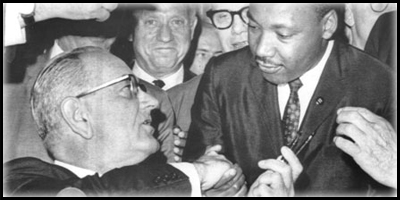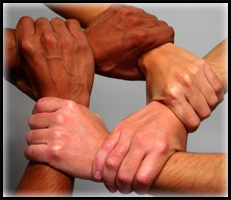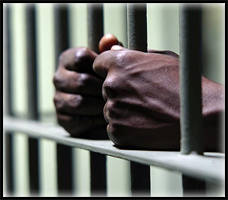-
Black History Month 2012, Part IV - "A Rising Tide Lifts All Ships," And The Tide Is Turning
February 21, 2012
Have an opinion? Add your comment below. It is important that at this time in our history the African-American community put aside any philosophical differences and network together economically, if we are to have any hope of continuing to progress in this new America.
-
As we conclude this celebration of Black History Month 2012, there are those who say that African-Americans should look to ourselves for solutions to our most pressing problems. The problem with that notion is that we don't always hold the means to solve problems that we didn't create. These same people say it begins with the classic interplay between the aggrieved blacks and tolerant whites. At times, as consummate victims we lay ourselves at the feet of our fellow citizens, exhibiting our lack of achievement as evidence of their failure, hoping to wring from their sense of conscience what we must assume, by the very logic of our claim, lies beyond our individual abilities to attain and achieve.

Here's a question many have thought about, but few have asked. How effective are suburban, middle-class "Generation Joneses" going to be in denying "status rewards" to rebellious ghetto teenagers who father illegitimate children? Welfare programs, it might be said, are what support "dysfunctional behaviors" in the ghetto. Change welfare, and this behavior has to change as well. And then we have to also include the overly simplistic notion that socioeconomic determinism is somehow to blame for the incentive provisions of certain government transfer programs and individual misbehavior.
Let's face it; we live in a new age. The United States of 2012 is not the same America of the 1970s, '80s, '90s or even the '00s. In those years and decades the air was filled with cries of civil rights, affirmative action, equal opportunity, "war on poverty," "The Great Society" and "Black is Beautiful."
While some progress is being made, for the most part, little is happening other than lip service from the government and the corporations involved, who seem to believe that somehow the covenants we've asked for will be implemented eventually and that we should continue to be patient. But America has been known to make promises along that line, first to the Native Americans and then to black slaves and history bears out how those promises have been kept and broken.
For some African-American leaders whose power depends on appealing to white guilt of the large inner-city ghetto with its population of poor blacks, this can be very useful as a symbol of continuing injustice. The suffering of the poorest African Americans creates a fund of political capital upon which all members of the group can draw when pressing racially based claims, including affirmative action preferences that some say go mainly to a growing segment of middle-class blacks.
One of the major criticisms leveled by minority-owned businesses is that government race-based, set-aside programs help only a few politically connected minority businesses while they neglect the needs of other minority contractors.
On the other hand, do we really want to tell a striving middle-class businessman who has barely managed to escape the ghetto that he has a special moral obligation to go back and tutor poor black children solely because his skin color is the same as theirs? The answer is "yes."
Affirmative Action Should Not Be The Only Action
The new ghettos, with their gigantic shelters, busy social-service facilities and deteriorating housing, employ thousands of social workers, guards, correctional officers, nurses and physicians at a huge cost. They may become even costlier in their contribution to dependency, illness, delinquency and waste. As much as they are defined by what they do, they are also defined by what they lack.

Affirmative action and the so-called "war on poverty," whose goal was to uplift the poor, has been redesigned to contain the poor and simply keep them alive. We all made it on the backs of struggling civil rights pioneers and strong, hard working families from the old school. Maybe some of us would have stopped our struggles if affirmative action hadn't given us a much needed break. The affirmative action backlash is sad. So is the divisiveness it has created. It has become almost as political as welfare reform.
Just ahead of this year's national elections, America today is still for the most part a conservative land and its people are preoccupied with Iraq, jobs, education, social security and other economic issues, perhaps more selfishly than at any time since the 1960s.
It is important that at this time in our history the African-American community put aside any philosophical differences and network together economically, if we are to have any hope of continuing to progress in this new America.
As we celebrate February, Black History Month, we must keep in mind that while Black America may have the power within itself to save itself, the real way to resolve America's race problem is to find a solution for its underclass. And we have got to be willing to make an enemy and an example of anyone who stands in the way of that solution.
We must discontinue practicing the exhibitionism of non-achievement. We have got to look forward to tomorrow, next February and beyond. We will have only ourselves to blame for not dealing with "the inherited nightmare." And if we remove the nightmare and replace it with more pleasant dreams, we then make America a better place for ourselves and we automatically make it a better place for our children.
The shift in thinking doesn't necessarily come easily, especially when it comes to education. The majority of teachers in America are white, middle-class women. No matter how well-intentioned they may be, they still need guidance. That's because unfortunately, in many urban school districts, minority students overall, perform at lower levels on state math and reading tests and graduate in fewer numbers than white students. I personally believe it's a critical plus factor in African-American children's development when they see their cultures reflected in the curriculum and valued in the classroom by teachers and/or administrators who may not be from the same culture. The emphasis on culturally responsive education is one component that's like a much-needed external push for today's African-American students. It's designed to move students to greater awareness of their cultural identity and make them stronger thinkers. It also promotes culturally responsive education by exposing students to the role of women in civil rights, interracial relations and conflicts within the Black community.
Focusing more closely than ever on the life pattern of young black men, new studies commissioned at Columbia, Princeton and Harvard show that the huge pool of poorly educated black men are becoming ever more disconnected from mainstream society, and to a far greater degree than comparable white or even Hispanic men. Especially in America's inner cities, the studies show just finishing high school is the exception, legal work is scarcer than ever and prison is almost routine, with incarceration rates climbing for Blacks even as urban crime rates have declined.

The percentage of black men graduating from college has nearly quadrupled since the passage of the 1964 Civil Rights Act, and yet more black men earn their high school equivalency diplomas in prison each year than graduate from college. Black families where men are in the home earn median incomes that approach those of white families. Yet more than half of the nation's 5.6 million black boys live in fatherless households, 40 percent of which are impoverished.
February should be a month when we recognize our obligations. We have a purpose to encourage our young people to step up. It's true that African-American students with the least money often have the most ambition and potential. We must continue to encourage these young people and keep them motivated so that one day they will contribute to a society that will understand them better, accept their differences and welcome their ideas.
It's true that a rising tide lifts all ships and it's time for us to set sail. On reflection, and despite our progress in many areas, if we are to ensure that 2012 will be remembered as an historic year in America's long journey toward universal justice and opportunity we must continue to look forward and glance back. We must look forward to a future filled with hope. And we must glance back to a past that gives us reason to keep that hope alive. Word.
-
-
